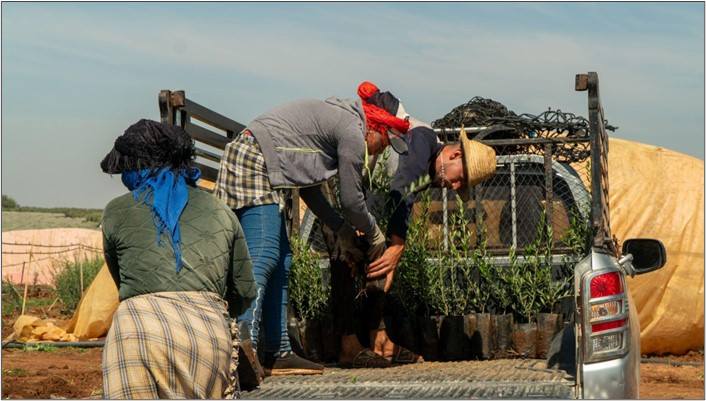By Kaitlyn Waring and Hanane Lahder
Farmers in Morocco are experiencing unprecedented challenges brought about by extreme droughts, high temperatures, and other impacts of climate change. The High Atlas Foundation (HAF) has developed long-standing projects focused on organic fruit and nut tree agriculture in order to adapt to these conditions while enabling farming families to grow, harvest, process, and sell endemic agricultural products.
HAF’s sustainable agriculture program is achieving widespread success from its inception, and especially within this year. The essential basis for the program’s achievements is the farming communities’ management of their own development.
In 2024, HAF assisted farming families in planting 1,040,183 trees in 10 of the 12 regions in Morocco. We also sewed over 3.2 million seeds in the 10 community nurseries supported by HAF, all with the intent of realizing the livelihood goals of farming families and enhancing agricultural diversity.
Based on fruit tree varieties prioritized by farmers of Morocco, these trees primarily include olive but also almond, argon, carob, cherry, fig, grape, mulberry, pomegranate, and walnut, as well as other forestry trees and herb species. This year’s tree distribution has already benefited 2,479 farming families, providing them with resources to improve their agricultural practices in a sustainable manner.
HAF emphasizes a participatory empowerment approach in all of its projects, where rural community members are actively engaged in the process of project design and shaping the agricultural paths that they see best for themselves. By empowering local communities through this participatory method, HAF aims to foster sustainable land use that reflects the specific needs and goals of each farmer. This promotes resilience and self-sufficiency of their agricultural practices far into the future, beyond HAF’s facilitation.
The real impact of HAF’s tree planting is seen in the large impact it has had on farmers and their families. For example, one farmer from a village in the Souq Tolba municipality of the Larache province, after receiving olive trees from HAF, expressed his appreciation at the quality of them. He had previously purchased the same species of trees in the past, but were of lower quality.
A farmer from another village, Kahf-n-Sour, had similar issues with the quality of seedlings he had received in the past. While this farmer had a passion for sustainable agriculture and caring for his land, his capacity was severely limited by the quality of crops he was able to produce. After being visited by a HAF tree monitoring officer who brought him some of HAF’s seeds, he also expressed admiration for their quality. He said, “These seedlings are completely different. I can feel their strength.”
Farmers in the Taroudant province express that HAF’s tree planting initiative has turned their own challenges into successes. Traditionally, these farmers grew oranges and melons that require a lot of water. But, in collaboration with HAF, they began planting trees that are more resilient to drought by requiring less water (such as olive, carob , and fig). The results from this transition have been significant.
Farmers who received the trees from HAF are now thrilled with their harvests each season. Inspired by the widespread success, many of them are planting more trees and expanding their lands while using less water to take advantage of their new opportunities. The shift has not only supported their livelihoods on a greater scale but also simultaneously promotes sustainable farming and care for land in the region.
Tree planting does not only benefit the farmers who receive the trees but also all people involved in maintaining the nurseries in which they grow. Mohammed El Assri is a dedicated caretaker at the Ouaouizeght nursery in Beni-Mellal Khenifra region, and has been a part of HAF since 2020. Married with three children, he found the opportunity to work close to home, which was a perfect fit for his family life. When Mohammed first joined the nursery, production levels were modest, but he quickly noticed the potential for growth. Over the years, significant progress has been made.
Now, the nursery distributes over 100,000 trees each year, a remarkable increase that reflects the hard work and commitment of the entire team. New equipment–seven greenhouses and a solar water pump system–has been added that makes operations much smoother. This transformation has not gone unnoticed. The community has recognized the nursery's evolution, and today, the Ouaouizeght nursery stands out as a well-known and respected source of trees to all the neighboring villages. Through his journey, Mohammed has witnessed firsthand the impact of dedicated teamwork and community support in creating a greener future.

Going forward, HAF plans to expand its reach to work with more farming communities across the nation. While the over one million trees planted with farming families and 3.2 million seeds planted in community tree nurseries all in the past year signifies an incredible milestone, HAF hopes to utilize this momentum to plant even more and promote sustainable agriculture everywhere. With partners and communities, we are already committed to plant five million seeds in nurseries during the 2025 season.
Vitally, HAF’s system of monitoring trees has received international certification in order to generate carbon offset credit units, creating an additional source of revenue for farming families of Morocco. This creates the opportunity for individuals and groups in and outside Morocco to participate in achieving the tree growing dreams of farming communities in all parts of the country.
Kaitlyn Waring is a student at Northeastern University, USA, and an intern at the High Atlas Foundation (HAF), a non-profit organization dedicated to promoting sustainable agriculture and women's empowerment in Moroccan farming communities.
Hanane Lahder is Reporting Officer at HAF
Oct. 28, 2024